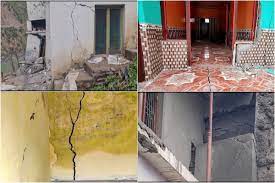Manas Dasgupta
NEW DELHI, Feb 3: After Uttarakhand and Himachal Pradesh, Jammu and Kashmir is now experiencing shifting of soil causing cracks in the buildings and roads. A Joshimath-like crisis is facing Jammu and Kashmir’s Doda district, where a village is sinking and more than 20 houses and a mosque have developed cracks, triggering panic among residents.
In a situation similar to the sinking of Joshimath in Uttarakhand, more than 200 men, women and children have been evacuated from Nai-Basti village of the Doda district in Jammu where several residential buildings developed wide cracks as the place was sliding.
Deputy Commissioner of Doda Vishesh Mahajan personally visited the village near the Thathri town to take stock of the situation and summoned top engineers of the highway authority, geology and mining experts as well as engineers to examine the spot and investigate the cause of the soil shifting, which has led to cracks in buildings. The experts have been asked to complete their tasks expeditiously and submit their report immediately.
Officials say the families are being shifted to a safer place. “We are taking all necessary actions to ensure safety of people and that they are not put to any kind of disadvantage,” Mahajan said. There are some 50 houses in village Nai Basti at Tathri municipal area. Several factors including the construction of roads and seepage of water may have caused the soil shifting in the hilly village, sources said.
The number of houses that have developed cracks have dramatically increased to 21 on Friday six days after the phenomenon was noticed. A mosque and a madrassa for girls have also been abandoned as the buildings were unsafe.
The Doda and Kishtwar districts of Jammu are being developed as the hydroelectric generation hub of the country with several power projects coming up in the area.
A couple of houses started developing cracks a few days ago, but the situation further aggravated on Thursday due to landslides. Panicked residents of the village said they had been living there for nearly 20 years but never faced such a situation.
The Thathri civic authorities visited the village and shifted 19 families to a government school and a pre-fabricated structure. Some people have shifted to the houses of their relatives. Senior superintendent of police also visited the village. Geologists of the power projects and National Highways Authority of India have inspected the sliding village near the Batote-Doda highway.
Others, whose houses have not yet developed cracks, were also worried as the entire village developed two decades ago was becoming unsafe for habitat. The cracks were first noticed in December, but were not taken seriously.
This is not an isolated incident of landslide in Jammu and Kashmir. Several other areas where construction of roads was undertaken are also witnessing such a situation, official sources said.
In Uttarakhand, the Chief Minister Pushkar Singh Dhami has claimed that about 70 per cent normalcy has returned to Joshimath and the state government was preparing for the Char Dham Yatra. Joshimath is the last halting station before reaching Badrinath, one of the four “dhams” of the Char Dham Yatra.
Dhami had also asserted that the state is not facing as much problem in Joshimath and adjoining areas as is being projected. Criticizing the politicians for playing politics over the Joshimath land subsidence matter, Dhami said, “Politicians should refrain from doing politics over the issue and come forward to provide a helping hand to the government in the difficult times.”
Speaking on the relief work in the affected areas of Joshimath, CM Dhami said the government is seeking suggestions from the stakeholders to effectively carry out the relief process. “Various committees have been set up in Joshimath to evaluate the situation. We are waiting for the reports and further process will be done on its basis,” he said.

